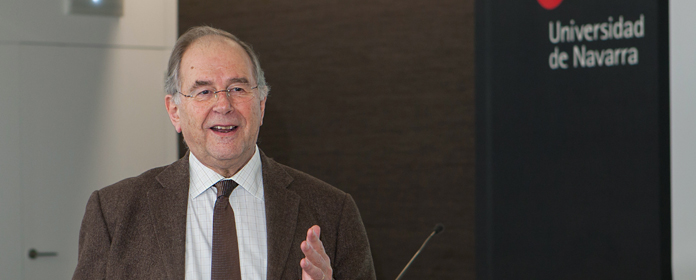"Geopolitical decisions weigh when it comes to making investments in developmentprojects "
Olivier Lafourcade, former director of the World Bank for Colombia, Mexico and Venezuela, gave a lecture organized by NCID.

PHOTO: Manuel Castells
"Does it make sense for a country to invest in the institutions of a nation whose government does not coincide with its political diary ? Geopolitical decisions weigh when it comes to making investments in projects on development". This was stated by Olivier Lafourcade, former World Bank executive, at the Navarra Center for International Development (NCID) of the University of Navarra.
As an illustration, he recalled the change that took place in the diary of the European Union for the development during the period in which the European Commissioner for Cooperation and development was a Spaniard. Likewise, the former executive highlighted the "geopolitical limits and constrictions" of the traditional system, a conglomerate that includes large investments from the traditional private sector such as Rockefeller; new fortunes such as Bill Gates; international NGOs such as Caritas; migratory remittances; companies and the recent sovereign wealth funds.
Lafourcade pointed out how, unlike international organizations such as the World Bank or the UN, private sources of resources follow their own criteria, as she indicated that donors such as Bill Gates can make "totally temperamental" contributions, in contrast to public institutions where "all decisions are made systematically and as a whole".
Effectively managing resources for innovationRegarding the topic of his lecture at the NCID, Olivier Lafourcade stressed that "to be innovative in financing for development you have to make the best use of resources". In this regard, he emphasized the importance of "achieving the efficiency of the traditional actors" that manage investments at development, such as multilateral and bilateral institutions, European agencies, specialized and private funds, and NGOs.
"The source main source of financing is direct taxes and those applied to consumption" stressed speaker, who recalled that "only 10% of aid comes from loans from multilateral organizations". In view of this status, the three-time director of the World Bank in Colombia, Mexico and Venezuela reminded that it is necessary to "mobilize the money" of SMEs, large businessmen and international organizations in the contribution to development.
For his part, he regretted that UN member countries do not contribute 0.7% of their GDP to financial aid at development, as established at the lecture International Conference on Financing for development in Monterrey in 2002.
But in addition to the criterion of how much money to invest, he posed the "vital" question of investors to development: "What criteria should I follow to know where I have to put my money?". The answer, in his words, is to "look at the efficiency of each actor". In addition to analyzing the management of each entity's resources before investing, he recalled that the limits set by government entities must be taken into account.
The expert made these statements during a lecture on financing to development and alternatives to traditional financing channels organized by the Navarra Center for International Development (NCID) of the University of Navarra. Institute for Culture and Society of the University of Navarra. He also gave a session at the Economics, Leadership & Governance Program of the School of Economics and Business Administration.




